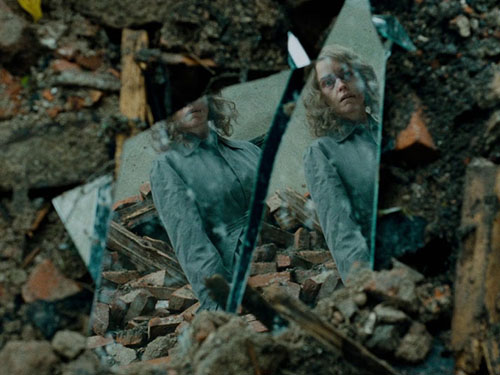
“These remains, remnants, and especially ghosts thereby inspire for Petzold not an empirical or documentary search for history and historical transformation but a haunted and uncanny one, one that points to Petzold’s elusive, spectral style. His is a ghostly archeology, one that dovetails with a recurring interest in the dissonant and disorienting effects of the horror genre [...]. Ghosts are not given to easy observation or facile explanation] – in terms of images, they would not offer themselves up to the camera straight on, as star actors of mainstream cinema normally would; rather, they prefer shadows and the conceptually ambiguous. Petzold’s cinema foregrounds this elusive aspect of the ghostly, its ephemeral character that lends to an ontological ambiguity, but one rendered ironically starker in the brightness and razor-sharp clarity of Petzold’s images [...].”
Jaimey Fisher1
Ryan Lattanzio: Why, then, did you want to set Phoenix as a postwar story?
Christian Petzold: I always thought with Harun Farocki, “Why don’t we have postwar movies in Germany?” Harun, who was my teacher, taught us why there is neo-realism in Italy. It’s a cinema that researches its own country. What happens after Mussolini? What stories can we tell? The Germans don’t have this postwar neorealism or rebuilding or reconstruction of cinema. We thought for 15 years, Harun and me, about Phoenix and after we made Barbara and he saw it on the editing table, he said, “Now we can do Phoenix because we changed the perspective from the male to the female.” We thought always about the men living in Germany, and the woman is coming, and she looks like his wife and he wants to recreate it. At this moment, when we changed the perspective, it was really new for us. Then we started writing.
Christian Petzold in an interview with Indiewire2
“Harun [Farocki] loved narrative films a lot. But he was essentially a scientist, a scholar of images and of pictures. And, of course, when we shot Transit he had already passed away, but with Phoenix he visited me on set and when he saw that we had 80 people there doing the choreography he was thrilled by it and he said, ‘This is so great, I could never, ever do anything like this!’ But he kept taking pictures he shot photos all the time, beautiful pictures. So we had a division of labor between us. Harun would examine the pictures and I had the freedom to dream and to fictionalize things together with him. I always loved when he made films and movies about cinema, and about the meaning of things in cinema. In Yella, for example, there was this episode that was a piece of dialogue that was originally part of a documentary that Harun had made about negotiations in a neo-liberal environment, and I took that original dialogue that was part of his documentary and fictionalized it and had Nina Hoss repeat that dialogue in one of my scenes. He then went on to show his students in Vienna at the Film Academy both these scenes with the identical text, the identical dialogues, and the students then assumed that he was responsible for the fictionalized version and that I was the one who did the documentary version. And so, actually, the fiction and the documentary parts somehow changed place and that’s when he said, ‘Okay, we have achieved everything we could ever achieve.’”
Christian Petzold in an interview with Film Comment3
- 1Jaimey Fisher, Contemporary Film Directors: Christian Petzold (Chicago: University of Illinois Press, 2013), 17.
- 2Ryan Lattanzio, “Why Phoenix Finally Makes Christian Petzold a New Arthouse Auteur,” Indiewire, July 2015.
- 3Jordan Cronk, “Berlin Interview: Christian Petzold,” Film Comment, February 2018.

